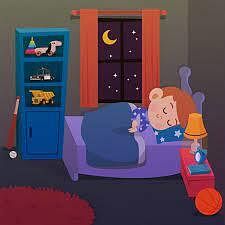UKG Exam > UKG Notes > English for UKG > Learn Opposite Words
Learn Opposite Words | English for UKG PDF Download
Introduction
- Opposites are words that have completely opposite meanings. They are also called antonyms.
- Learning opposites helps us understand the world better and improves our vocabulary.
Common Opposites for UKG
- Hot - Cold:
- Hot means something is very warm. Cold means something is not warm; it is chilly.
- Examples: The sun is hot. Ice cream is cold.

- Big - Small:
- Big means something is large or huge. Small means something is not big; it's tiny.
- Examples: An elephant is big. A butterfly is small.

- Fast - Slow:
- Fast means something moves quickly. Slow means something moves at a relaxed pace.
- Examples: A car is fast. A tortoise is slow.

- Up - Down:
- Up means going in a higher direction. Down means going in a lower direction.
- Examples: The kite goes up. The ball falls down.

- Happy - Sad:
- Happy means feeling joyful and cheerful. Sad means feeling unhappy or upset.
- Examples: When you get a gift, you feel happy. When you lose a toy, you feel sad.

- Day - Night:
- Day is the time when there is sunlight. Night is the time when it's dark.
- Examples: We play during the day, and we sleep at night.

- Open - Close:
- Open means something is not shut or locked. Close means something is not open; it's shut.
- Examples: You can open a door and close it.

- In - Out:
- In means going inside something. Out means coming outside something.
- Examples: You go in the house, and then you come out to play.

Fun Activities to Learn Opposites
- Opposite Pairs Matching Game:
- Create cards with pictures of opposites, and let your child match them (e.g., hot-cold, big-small).
- Opposite Storytime:
- Read a simple story with opposites and ask your child to point them out (e.g., The bear is big, but the mouse is small).
- Opposite Charades:
- Act out opposites and have your child guess what you are doing (e.g., walk fast, then walk slow).
- Opposite Song:
- Sing a song about opposites together to make learning more fun.
Conclusion
- Learning opposites is an exciting way to build your child's vocabulary and understanding of the world around them.
- Keep practicing with your child through games, stories, and songs to reinforce these important concepts.
The document Learn Opposite Words | English for UKG is a part of the UKG Course English for UKG.
All you need of UKG at this link: UKG
|
42 videos|47 docs|3 tests
|
FAQs on Learn Opposite Words - English for UKG
| 1. What are opposite words? |  |
Ans. Opposite words are pairs of words that have contrasting meanings. They are antonyms of each other and convey opposite ideas or concepts.
| 2. Why is it important to learn opposite words? |  |
Ans. Learning opposite words is important as it helps in expanding vocabulary, enhancing language skills, and improving communication. It allows individuals to express themselves more precisely and helps in understanding the nuances of language.
| 3. How can I teach opposite words to a UKG student? |  |
Ans. Teaching opposite words to a UKG (Upper Kindergarten) student can be done through various fun and interactive activities. Some methods include using flashcards, playing matching games, singing songs, and engaging in role-playing activities. It is important to make the learning process enjoyable and age-appropriate.
| 4. Can you provide examples of opposite words for UKG students? |  |
Ans. Yes, here are a few examples of opposite words suitable for UKG students:
- Hot - Cold
- Tall - Short
- Big - Small
- Happy - Sad
- Fast - Slow
| 5. How can I assess a UKG student's understanding of opposite words? |  |
Ans. Assessing a UKG student's understanding of opposite words can be done through various methods. You can ask them to identify and match opposite words, use opposite words in sentences, or play a game of "opposite word charades" where they act out the opposite of a given word. Observation and informal discussions can also provide insights into their understanding.

|
Explore Courses for UKG exam
|

|
Signup for Free!
Signup to see your scores go up within 7 days! Learn & Practice with 1000+ FREE Notes, Videos & Tests.
Related Searches

























